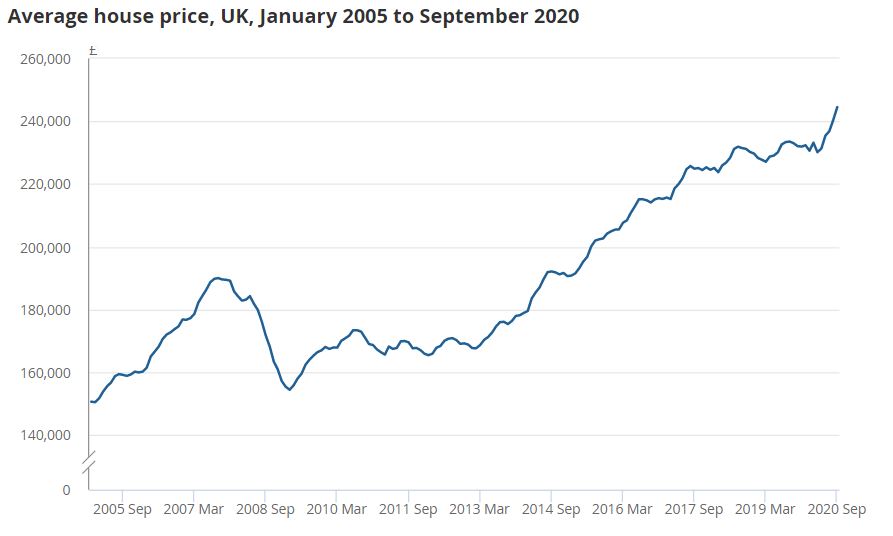What Will Happen to House Prices During Coronavirus

The Coronavirus pandemic is forcing society into a shutdown and the economy into meltdown. Recessions often start with a trigger and it is now apparent that this years pandemic has caused a global recession. The circumstances surrounding social distancing means that businesses are having to at best rearrange the way they work and at worst close their doors. With many people being left uncertain about getting their next pay check and people being told to stay at home, this global recession may be the start of a downfall for property prices. The extent to how far property prices will fall will depend on how severe and prolonged this current recession will last.
How Severe will the Recession Be?
Recessions are of a cyclical nature and we have seen that historically a global recession has happened around every 10 years. It needs to be considered that a recession was probably already on the horizon regardless of the virus outbreak. In 2001 the dot com bubble burst and in 2008 we had the sub prime lending crash, a global shutdown of our economy seems to be more extreme. A recession is usually caused by a trigger and the extraordinary circumstances that we are currently experiencing is unprecedented. Since 2017 the world has experienced a global slowdown in growth, but now with the economy being forced into a global shut down the big question is how long will this Coronavirus outbreak last? If we can get life back to normal in the next couple of months then this may just be a blip on our economy. However, if these restrictions on normal life continue for much time longer than we may have to experience a prolonged economic downturn that would more likely resemble a wartime depression.
On the 7th May The Bank of England announced that we could be facing the worst recession in 300 years, with there being the fastest fall in our economy since 1709. This announcement made headline news and caused a bit of a shock to everyone who heard it.
In contrast, more recently some more optimistic opinion on what the next recession will be like has been provided by Andy Haldane who is The Bank of England Economist. He says, that more recent data shows business activity has already recovered at a modest rate, and a poll of economists predict a rapid recovery for our economy during 2021 with predictions of a more V shaped recovery of a sharp decline followed by a quick recovery. This could be good news for the property market as a buoyant quick moving property market usually coincides with an optimistic outlook for growth. It is expected that with Coronavirus out the way The UK could experience 5.2% growth during 2021.

Lenders Restrict Mortgages Just in case Prices Fall
A good indication of where house prices may be heading can be seen from the analysts of the mortgage lenders. In recent months lenders have pulled the amount of 10% deposit mortgages from the market in a dramatic way. Before the crisis there were 779 10% deposit mortgages available, this has now fallen to less than 60 as is discussed in this article from The BBC. It is thought that lenders are preparing themselves for a fall in house prices and so that new home buyers don’t find themselves in negative equity they are now commanding higher deposits of at least 15%.
Are We Officially in a Recession?
The official working definition of a recession is two negative quarters and we have now experienced this. On the official Wikipedia page showing the list of recessions for The UK it’s now displaying that we have had Q2 of negative growth, they have dubbed the new recession the “coronavirus recession”, it’s displaying a drop of -14.5% growth for the second quarter of 2020.
How Much Did House Prices Fall in the Last Recession
During the first year of the 2008 recession house prices fell almost 16% which was also 18% lower than the previous high from 2007. History shows us that it’s very possible for house prices to fall around 20% in a recession. The current circumstances of a virus outbreak seem to be far more severe than previous reasons for why the world fell into recession so the impact may be greater. Typically, property prices don’t fall overnight so it may take some time until prices fall lower, for example in the last recession prices fell for a consecutive 14 months. If the world can quickly overcome the virus outbreak then prices may not have enough time to fall as much as they did in the last downturn.
The chart below shows the downfall and recovery since the 2007 recession.

The quicker we can tackle Coronavirus then the more likely we are to avoid a prolonged recession, however the wheels may have already been put into motion and a recession is inevitable. Most importantly we need to keep an eye on the global coronavirus situation it seems that the death toll across the world is coming down and more people are being tested across the world. In terms of tackling the virus it seems that we are starting to turn a corner.
The Stamp Duty Break Has Propped up Prices
The Stamp Duty Holiday has proven to have a positive effect on house prices. So much so that we have seen a scramble in transactions and new records being set. In fact, August saw the highest monthly price rise in 16 years which is surprising, seeing that we are currently in the midst of a global recession and the worst pandemic we have ever seen. It seems that people are happy to put their faith in property as it has proven to be a sound long term investment for many years. The stamp duty break lasts until March and it’s coming to a end may be a trigger for a fall in prices.
If you are a homeowner concerned about meeting your monthly mortgage payments then please see our article about the Financial Help the Government are Offering to Homeowners during Coronavirus